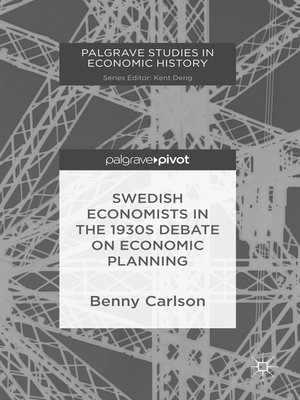Swedish Economists in the 1930s Debate on Economic Planning
ebook ∣ Palgrave Studies in Economic History
By Benny Carlson

Sign up to save your library
With an OverDrive account, you can save your favorite libraries for at-a-glance information about availability. Find out more about OverDrive accounts.
Find this title in Libby, the library reading app by OverDrive.



Search for a digital library with this title
Title found at these libraries:
| Library Name | Distance |
|---|---|
| Loading... |
The 1930s, characterised by repercussions from World War I and the Great Depression, was an era of populism, nationalism, protectionism, government intervention and attempts to create planned economies. The perceived need for economic planning emerged in Sweden in part due to the increasing political strength of the Social Democrats and their evolution from a party hampered by Marxist fatalism to a pragmatic mass movement. The Swedish debate continued beyond World War II and is still relevant to today's economic crises, which have resulted in a demand for action coming from below (populism) and above (elitism).
Carlson surveys the arguments for and against economic planning as they were put forward by leading Swedish economists in the 1930s, with a focus on the thoughts of Gustav Cassel, Eli Heckscher, Gösta Bagge, Gunnar Myrdal and Bertil Ohlin, among others. In so doing he provides a timely exploration of the debate on the necessary and desirable extentof state intervention in market economies.






